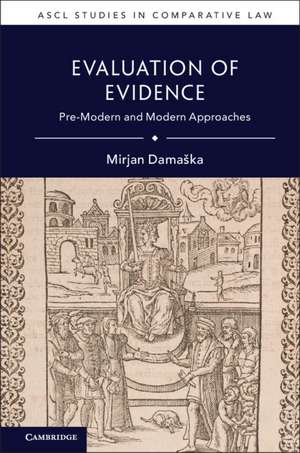Evaluation of Evidence: Pre-Modern and Modern Approaches: ASCL Studies in Comparative Law
Autor Mirjan Damaškaen Limba Engleză Hardback – 19 dec 2018
| Toate formatele și edițiile | Preț | Express |
|---|---|---|
| Paperback (1) | 278.24 lei 6-8 săpt. | |
| Cambridge University Press – 26 feb 2020 | 278.24 lei 6-8 săpt. | |
| Hardback (1) | 717.34 lei 6-8 săpt. | |
| Cambridge University Press – 19 dec 2018 | 717.34 lei 6-8 săpt. |
Preț: 717.34 lei
Preț vechi: 834.11 lei
-14% Nou
Puncte Express: 1076
Preț estimativ în valută:
137.28€ • 149.07$ • 115.31£
137.28€ • 149.07$ • 115.31£
Carte tipărită la comandă
Livrare economică 22 aprilie-06 mai
Preluare comenzi: 021 569.72.76
Specificații
ISBN-13: 9781108497282
ISBN-10: 1108497284
Pagini: 160
Dimensiuni: 158 x 235 x 13 mm
Greutate: 0.32 kg
Editura: Cambridge University Press
Colecția Cambridge University Press
Seria ASCL Studies in Comparative Law
Locul publicării:New York, United States
ISBN-10: 1108497284
Pagini: 160
Dimensiuni: 158 x 235 x 13 mm
Greutate: 0.32 kg
Editura: Cambridge University Press
Colecția Cambridge University Press
Seria ASCL Studies in Comparative Law
Locul publicării:New York, United States
Cuprins
Prologue; 1. The origin of Roman-canon legal proof for criminal cases; 2. Epistemic foundations; 3. Orientation in the labryinth; 4. The two-eyewitnesses rule; 5. The probative impact of confessions; 6. The negative impact of legal proof; 7. Roman-canon rejection of persuasive evidence; 8. Evading the Roman-canon full proof standard; 9. Recapitulation; 10. Continental successors to Roman-canon legal proof; 11. Roman-canon legal proof and common law evidence; Epilogue.
Recenzii
'In Evaluation of Evidence, Mirjan Damaška takes on the essential but ever difficult problem of finding the right amount of space that fact-finders should be allowed in determining guilt and innocence. He juxtaposes the relatively strict approach of Roman-canon law, that limited evidence by 'affixing the value of evidence in advance' with the broader freedom permitted by modern law. He thus expands our contemporary thinking and thoughtfully explores the likely challenges of the future.' Oscar G. Chase, Russell D. Niles Professor of Law, New York University School of Law
'Mirjan Damaška is the most learned and perceptive comparative law scholar of the last fifty years. In this important book, he questions standard views about how the rules of evidence were understood in Roman-canon law and inquisitorial proceedings, articulates an alternative historical account about it, and provides key insights about how we should think about the evaluation of evidence in our time. This book is indispensable for anyone interested in the past, present and future of the law of evidence and legal adjudication.' Máximo Langer, University of California, Los Angeles School of Law
'The sixteenth century was a great century in the history of European criminal procedure, and Prospero Farinacci was procedure's most famous and important practitioner. Damaška has skillfully used these cases to illustrate the procedural rules that Farinacci and other jurists from Baldus to Carpzov developed and form the foundation of modern criminal law. This book will be a valuable supplemental text for criminal procedure law courses.' Ken Pennington, The Catholic University of America
'The book is an outstanding historical research about some of the most important topics concerning the evaluation of evidence in criminal law. Damaška's view is original, based upon a wide and deep analysis of the historical sources. Evaluation of Evidence is an important contribution to the history of judicial systems, in particular the evolution of evidentiary rules and the function of courts, with main reference to the inquisitorial model that dominated the Western world for several centuries.' Michele Taruffo, University of Pavia, Italy
'Mirjan Damaška is the most learned and perceptive comparative law scholar of the last fifty years. In this important book, he questions standard views about how the rules of evidence were understood in Roman-canon law and inquisitorial proceedings, articulates an alternative historical account about it, and provides key insights about how we should think about the evaluation of evidence in our time. This book is indispensable for anyone interested in the past, present and future of the law of evidence and legal adjudication.' Máximo Langer, University of California, Los Angeles School of Law
'The sixteenth century was a great century in the history of European criminal procedure, and Prospero Farinacci was procedure's most famous and important practitioner. Damaška has skillfully used these cases to illustrate the procedural rules that Farinacci and other jurists from Baldus to Carpzov developed and form the foundation of modern criminal law. This book will be a valuable supplemental text for criminal procedure law courses.' Ken Pennington, The Catholic University of America
'The book is an outstanding historical research about some of the most important topics concerning the evaluation of evidence in criminal law. Damaška's view is original, based upon a wide and deep analysis of the historical sources. Evaluation of Evidence is an important contribution to the history of judicial systems, in particular the evolution of evidentiary rules and the function of courts, with main reference to the inquisitorial model that dominated the Western world for several centuries.' Michele Taruffo, University of Pavia, Italy
Notă biografică
Descriere
Well-chosen negative legal proof rules can be useful procedural safeguards. They existed in both pre-modern and modern criminal procedures.















